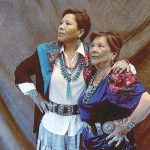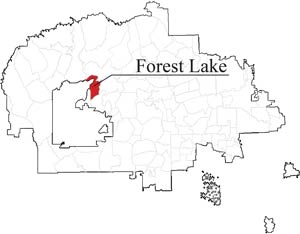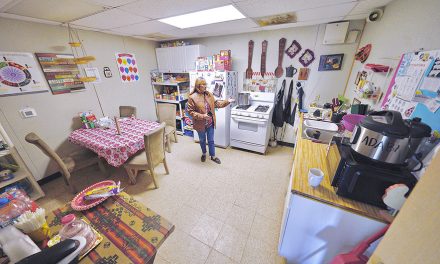
Guest Column | How damaging was boarding school for you?
By EleVena Burbank
So how damaging was federal boarding school or residential school for you?
I’d say that depended on the school and the teachers. Although the teachers didn’t administer the school, they interacted with us on a daily basis, so in this sense, it was important to get along with a teacher.
At Chinle Boarding School, the oppression was in the dorm and the first thing that comes to mind is the way we were required to complete our chores such as sitting on our knees to shine floors.
Selected dorm leaders, which were girls our own age favored by staff, lined us up in columns with rolled up wool rags that look like fat burritos . Then, sitting on our knees, we shined the floor, moving from one side of the hall to the other, like a marching band in a parade.
It made sense to do this in the evening, in our jeans, but no. We did this just before classes in the morning, ruining our fresh clothes we just put on.
I was in high school when I finally succeeded scrubbing the ch’izzie skin off my knees.
“Why these dorms run by stern Navajo staff?” I often wondered.
Yes, very uptight. I never found out where they came from. They acted like they had no relatives, which, according to the late artist R.C. Gorman, was the worst insult anyone can say about you.
Still, the real Nazis were dorm “leaders” handpicked by the staff. These were big girls who stole your clothes and money, if you were lucky to have any.
These Nazi girls were always believed by dorm staff. Often it was these Nazis who decide when to shine the floors. They could enslave you, too, like doing their laundry or delivering messages to their boyfriends like the nurse maid in Shakespeare’s “Romeo & Juliet.”
Still, the so-called dorm leaders were rejects themselves, who were often overage from repeating a grade or two too many times, though they can create vicious lies and report you to dorm staff.
In the classroom, some of the dorm leader/tyrants were dull and struggled with reading and other subjects, so I looked to the classroom as a place of justice. You had to create some kind of hope to survive, right?
Most of my teachers were nice and I felt safe in their surroundings. I don’t recall any of them disdaining my Navajo language and culture.
However, I can see how this was the main goal of “Indian education” and its destructive influence in the Carlisle Indian School days.
By the way, I want to pay tribute to all the Native children who perished in these boarding schools. They were the heroes.
The destructive influence of this ancient policy continues in our communities today as many Navajos continue to use it as an excuse to not teach Dineh language to their children, is one simple example.
By removing children from their parents, the federal government also broke sacred bonds between child and nurturer. This resulted in stoicism and lack of empathy on the part of the child.
You become how you are raised. For instance, an 8-year-old male in a boarding school had to be tough and taught not to show emotion. The same objective was projected on girls, but females are born with maternal instinct, thanks to Mother Nature!
We care very much about making others feel better and we value emotions – empathy. The government schools could not take this away from us.
The same can’t be said for the young men unfortunately. Due to this rigid practice forced on them for centuries, the consequences of this brutality remain even today as men are usually the ones to break up a good family or dismiss a thriving relationship.
Can this also explain the alcoholism, addiction and perpetrators in murdered and missing Native women cases?
Stoicism and masochism are passed on for generations. You are what you see.
My third-grade dormitory had 68 girls and one staff. With this many students, a worker could not possibly teach us about patience like a parent would. This resulted in students lacking the skills in going through a process – like trying and failing and trying again was not something we were motivated to put in our brain. Many of us get bored so easily and give up something after a few tries.
Lack of empathy at such a young age create instabilities later on in families, broken families and children being raised by grandparents.
In such families, one parent, usually the woman, has to step up to keep food on the table while the children raise each other, if grandparents aren’t available.
Today even televisions are used as babysitters in single parent households while a parent works two or more jobs.
This also explains why Dineh children remain at the bottom in academic performances in schools. I realize this sounds bleak, but we have to know why before we can apply correction(s), or know the enemy before defeating it.
To be fair, I must say modern day boarding school or residential schools have undergone profound changes, at least on our reservation. For instance, Wingate High School’s students yearly academic progress reports them performing at the same level as neighboring public high schools or better as state test scores before the pandemic indicated.
Wingate’s residential halls have active Navajo culture and language programs plus all the dormitories have full staff of evening counselors and tutors, to name but a few.
Many Farms High has had a complete makeover for decades now. Both schools have graduated outstanding students including GATES scholars.
EleVena Burbank is a teacher from Tachee/Blue Gap, Ariz.








 Highway 264,
Highway 264, I-40, WB @ Winslow
I-40, WB @ Winslow